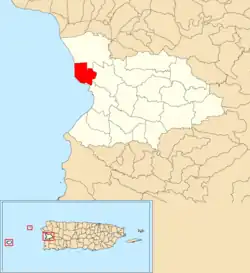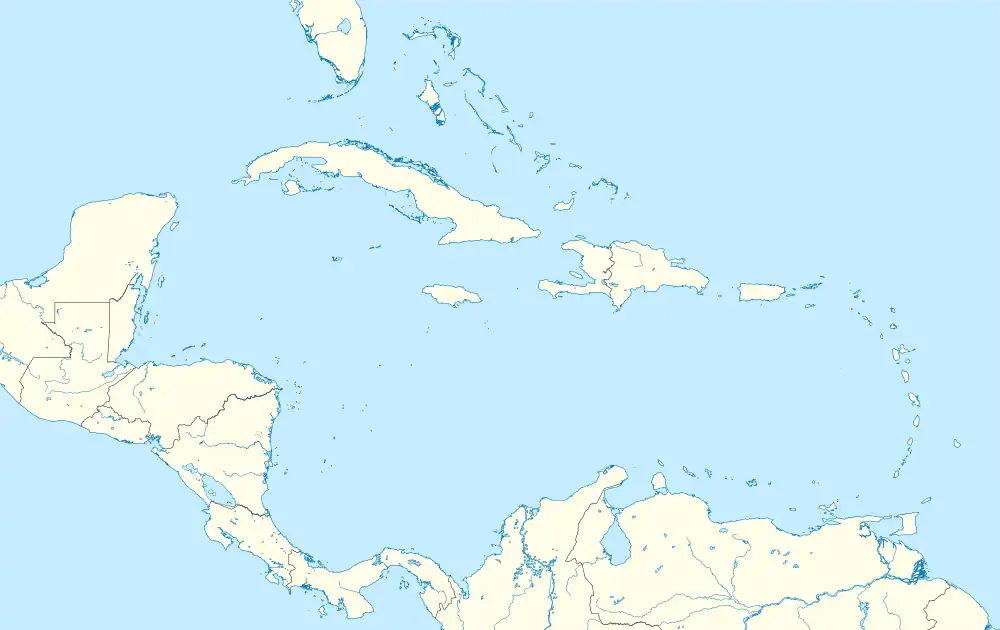Algarrobos | |
|---|---|
Barrio | |
 Location of Algarrobos within the municipality of Mayagüez shown in red | |
 Algarrobos Location of Puerto Rico | |
| Coordinates: 18°13′47″N 67°10′02″W / 18.229657°N 67.167322°W[1] | |
| Commonwealth | |
| Municipality | |
| Area | |
| • Total | 2.43 sq mi (6.3 km2) |
| • Land | 1.66 sq mi (4.3 km2) |
| • Water | 0.77 sq mi (2.0 km2) |
| Elevation | 72 ft (22 m) |
| Population (2010) | |
| • Total | 4,383 |
| • Density | 2,640.4/sq mi (1,019.5/km2) |
| Source: 2010 Census | |
| Time zone | UTC−4 (AST) |
Algarrobos is a barrio in the municipality of Mayagüez, Puerto Rico. Its population in 2010 was 4,383.[3][4][5]
Background
Algarrobos is a coastal, rural barrio deriving its name from the Algarrobo tree. The Algarrobo tree is leguminous, with shiny leaves and purple and white flowers. Its fruit is the carob bean, which consists of seeds covered by an edible substance, contained in a capsule-shaped pod.[6]
History
Mayagüez was a perfect smugglers' shelter for being a distance away from the barracks occupied by authorities. Its value was the strategic entrance to the Castillo de los Valdés in Algarrobos. In the eighteenth and nineteenth centuries there was in its jurisdiction a stronghold, the Algarrobo Fort, and Spanish battalions were there, one by the sea and another on the west side of Cerro de El Vigia. In the mid-twentieth century there was an American battalion located by the sea in the vicinity of Peña Cortada.[6]
Algarrobos was in Spain's gazetteers[7] until Puerto Rico was ceded by Spain in the aftermath of the Spanish–American War under the terms of the Treaty of Paris of 1898 and became an unincorporated territory of the United States. In 1899, the United States Department of War conducted a census of Puerto Rico finding that the population of Algarrobo barrio was 1,054.[8]
| Census | Pop. | Note | %± |
|---|---|---|---|
| 1900 | 1,054 | — | |
| 1910 | 1,003 | −4.8% | |
| 1920 | 965 | −3.8% | |
| 1930 | 1,422 | 47.4% | |
| 1940 | 1,796 | 26.3% | |
| 1950 | 1,380 | −23.2% | |
| 1960 | 2,219 | 60.8% | |
| 1970 | 2,769 | 24.8% | |
| 1980 | 5,354 | 93.4% | |
| 1990 | 5,074 | −5.2% | |
| 2000 | 4,792 | −5.6% | |
| 2010 | 4,383 | −8.5% | |
| U.S. Decennial Census 1899 (shown as 1900)[9] 1910-1930[10] 1930-1950[11] 1980-2000[12] 2010[13] | |||
Economy
Between 1962 and 1998 it was the base port and the headquarters of the largest tuna factory in America.[6]
See also
References
- 1 2 "US Gazetteer 2019". US Census. US Government.
- ↑ U.S. Geological Survey Geographic Names Information System: Algarrobos barrio
- ↑ Picó, Rafael; Buitrago de Santiago, Zayda; Berrios, Hector H. Nueva geografía de Puerto Rico: física, económica, y social, por Rafael Picó. Con la colaboración de Zayda Buitrago de Santiago y Héctor H. Berrios. San Juan Editorial Universitaria, Universidad de Puerto Rico,1969.
- ↑ Gwillim Law (20 May 2015). Administrative Subdivisions of Countries: A Comprehensive World Reference, 1900 through 1998. McFarland. p. 300. ISBN 978-1-4766-0447-3. Retrieved 25 December 2018.
- ↑ Puerto Rico: 2010 Population and Housing Unit Counts.pdf (PDF). U.S. Dept. of Commerce, Economics and Statistics Administration, U.S. Census Bureau. 2010.
- 1 2 3 Valentin Calderon, Lionel. "Barrio Algarrobos" (in Spanish). Aquí Esta Puerto Rico.
- ↑ "Anuario del comercio, de la industria, de la magistratura y de la administración. 1881". Biblioteca Nacional de España (in Spanish). p. 1614. Retrieved 4 April 2023.
- ↑ Joseph Prentiss Sanger; Henry Gannett; Walter Francis Willcox (1900). Informe sobre el censo de Puerto Rico, 1899, United States. War Dept. Porto Rico Census Office (in Spanish). Imprenta del gobierno. p. 164.
- ↑ "Report of the Census of Porto Rico 1899". War Department Office Director Census of Porto Rico. Archived from the original on July 16, 2017. Retrieved September 21, 2017.
- ↑ "Table 3-Population of Municipalities: 1930 1920 and 1910" (PDF). United States Census Bureau. Archived (PDF) from the original on August 17, 2017. Retrieved September 21, 2017.
- ↑ "Table 4-Area and Population of Municipalities Urban and Rural: 1930 to 1950" (PDF). United States Census Bureau. Archived (PDF) from the original on August 30, 2015. Retrieved September 21, 2014.
- ↑ "Table 2 Population and Housing Units: 1960 to 2000" (PDF). United States Census Bureau. Archived (PDF) from the original on July 24, 2017. Retrieved September 21, 2017.
- ↑ Puerto Rico: 2010 Population and Housing Unit Counts.pdf (PDF). U.S. Dept. of Commerce Economics and Statistics Administration U.S. Census Bureau. 2010. Archived (PDF) from the original on 2017-02-20. Retrieved 2019-08-02.